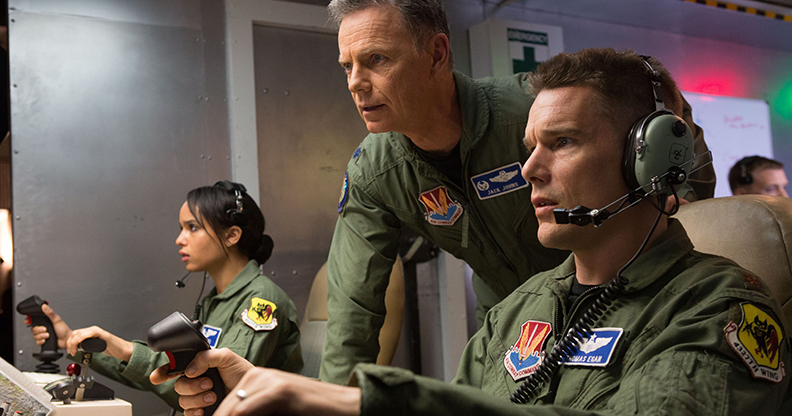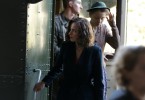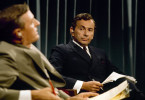Good Kill
Director: Andrew Niccol
5:30 p.m., 8 p.m. Friday–Saturday; 2 p.m., 5:30 p.m. Sunday
Oklahoma City Museum of Art
C-
Kathryn Bigelow’s The Hurt Locker set a high precedent for war films about modern conflict. With it, human flaw, fear and doubt enter a genre that, with a few rare exceptions, lauds the very distant notion of machismo and integrity. With Good Kill, Andrew Niccol attempts to pluck at the same organic chords Bigelow played so well a few years ago. Unfortunately, the filmmaker’s swing at a substantial and contemplative discussion on the nature of drone strikes just feels a bit contrived, losing itself long before takeoff.
Thomas Egan (Ethan Hawke) is a U.S. pilot whose tenure inside of a traditional jet has come to an end with the rise of unmanned attack drones. To his dismay, Thomas wades through his remaining stint of service flying the devices that grounded him from the comfort of Las Vegas. Thomas longs for the days of actual flight, but the emotional toll on his wife, Molly (January Jones), and two children seems far too severe. Likewise, his superior, Colonel Jack Johns (Bruce Greenwood), insists that a pending promotion is more than enough reason to keep his feet on the ground. A shift of management to the CIA, along with new orders to kill indiscriminately based on predictions, strains the composure of Thomas’ humanity.
The picture Niccol paints isn’t terribly far off from something like Sam Mendes’ American Beauty as it trails a seemingly disenfranchised man vying to feel alive. As his work grows more inhuman, Thomas similarly grows more detached, cold and unresponsive. Pieces of the American are illustrated in spades: Thomas’ classic car, his attractive family and a decent-sized house. Yet it all has left him terribly unfulfilled.
This would normally be the prerequisite of something thoughtful and insightful. But again, it all feels so forced and overt that it’s difficult to see any of the characters as more than just obvious representations of a particular train of thought. Likewise, conversations and arguments between Thomas’ grow to be unnecessary as subtlety is lost within Niccol’s script. It’s like each character is a part of some abstract mosaic: A vibrant and loud image appeases the eye momentarily but quickly loses its appeal when played off as reality.
The performances are some the film’s few saving graces, but even exceptional delivery can’t help Niccol’s writing from appearing abrupt and deprived. Greenwood passes as a reluctant superior so well that he may run the risk of being typecasted (if he hasn’t already, of course). Hawke possesses this sort of fractured stoicism that, under any other circumstances, would soar with this kind of character. The actor carries himself with a tension that has apparently grown to be second nature with time. His breathing is minimal, his grip is always tight, and a violent outburst always seems inevitable. Still, it’s not enough to keep Thomas from coming off as an insincere caricature.
One of the most pressing notions — the idea of a drone pilot as some kind of terrestrial god — is made evident by the film’s most engaging scenes. The grainy feed of the craft’s targeting system conveys both community and intimate atrocities from afar. Just like Thomas, we’re given excruciating detail of the targets’ demise, yet the abrupt reminder of the pilot’s physical distance is always a shock. A glimpse of a few burning corpses belonging to Taliban, women and children are cast aside with the gentle nudge of a throttle. Thomas’ description of his average workday is moving at first, but quickly grows tiring after constant regurgitation. It’s as if Niccol knew he had something but was terribly afraid of his audience not grasping it. The insult hits close and never really ceases.
With the recent rise of war recounts like American Sniper and Lone Survivor, a film like Good Kill should’ve been an adequate antithesis to the growing myth of war. But the film is quickly revealed to be a facade, and when it crashes, it crashes hard.





